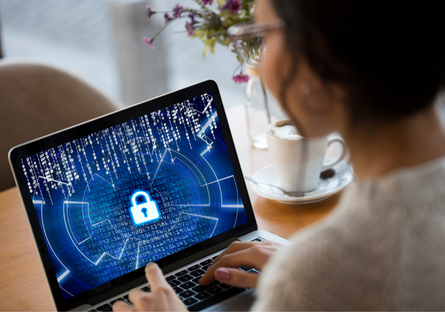This article appears for archival purposes. Any events, programs and/or initiatives mentioned may no longer be applicable.

The Maricopa Community College Information Security Department collected the top tips to keep your computer and information safe while you are online. While they are interested in and work diligently to protect the MCCCD network, these tips are applicable to all computer users.
Password
Using weak passwords is one of the greatest risks for any user. We use passwords to sign into our computers, manage our bank accounts, unlock our smartphones, and access our social media. In addition to being unique, passwords should contain a mix of letters, numbers, and symbols. Maintaining strong and unique passwords will decrease the risk of password guessing, based on commonly used passwords, information about you that might be publicly available, or password cracking tools that hackers use.
Phishing
What is phishing? Phishing is a fraudulent attempt to obtain sensitive information such as usernames, passwords, and credit card details, often for malicious reasons by masquerading as a trustworthy entity in an electronic communication.
Since these emails tend to look authentic, it is important to know how to spot a phishing email. Listed below are some red flags, which may indicate an email is phishing for information:
- You do not recognize the sender’s email address, or you do not regularly communicate with the sender.
- An email is not related to your regular job responsibilities, is sent concerning services you did not request or contains a file you were not expecting.
- You are being threatened with negative consequences or being offered something of value in exchange for clicking a link or downloading a file.
- There are other people copied on the email that you do not recognize, or who seem to be an unrelated or unusual mix of people.
- The email was sent at an unusual time like 3 a.m. or by someone you know is out of the office.
- One or more of the links or domain names seem unusual or misspelled.
- Other misspellings or grammar mistakes that seem out of character.
Protecting your Data
Many of us may think that protecting our devices are someone else's job—or maybe even the job of the manufacturer. This misconception is inaccurate; information security is the owner's responsibility. Below are a few ways you can protect your devices and sensitive information.
- Always password protect files that contain sensitive information such as a social security number.
- Never disable your antivirus. If you work from home and use your personal laptop or workstation, make sure you get your laptop/workstation approved and antivirus is installed.
- Avoid clicking on suspicious links.
- Never share your password.
- Make sure you do not cancel software updates. Many times these updates contain security fixes.
Privacy
Detecting possible problems and remaining safe from the risk of malware and other cyber threats is as simple as erring on the side of safety and being able to identify suspicious activity.
Some key indicators that you may have a virus or your computer/account were hacked:
- Your password is not working. This could signify a temporary issue with a website’s Internet connection or an attacker has hijacked your account and changed your password.
- People receive emails or social media invites from you, which you did not send.
- You get a large number of pop up advertisements.
- You get fake antivirus messages.
- You have unexplained online activity.
- You have new browser toolbars, applications or software, which you do not recognize or did not install.
Be proactive! Here are some ways to avoid being hacked:
- Become acquainted with the self-service password reset tools and update your challenge questions and cell phone number. If you find yourself locked out of your account, try resetting your password.
- Perform Google's security check-up on your account (https://myaccount.google.com/secureaccount) and provide a recovery email address and a recovery phone number. Google may use this to present you with a challenge text message or email in the event suspicious behavior is detected.
- Avoid using public or guest Wi-Fi hotspots when checking work-related and sensitive information.
- If you travel out of state or out of the country on business, consider informing your IT team with the dates and place(s) you will be traveling.